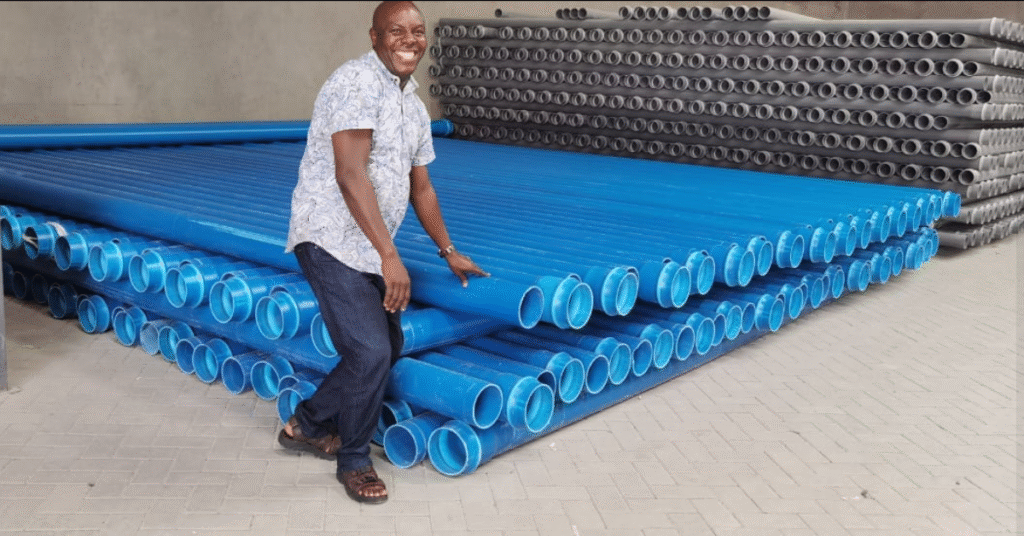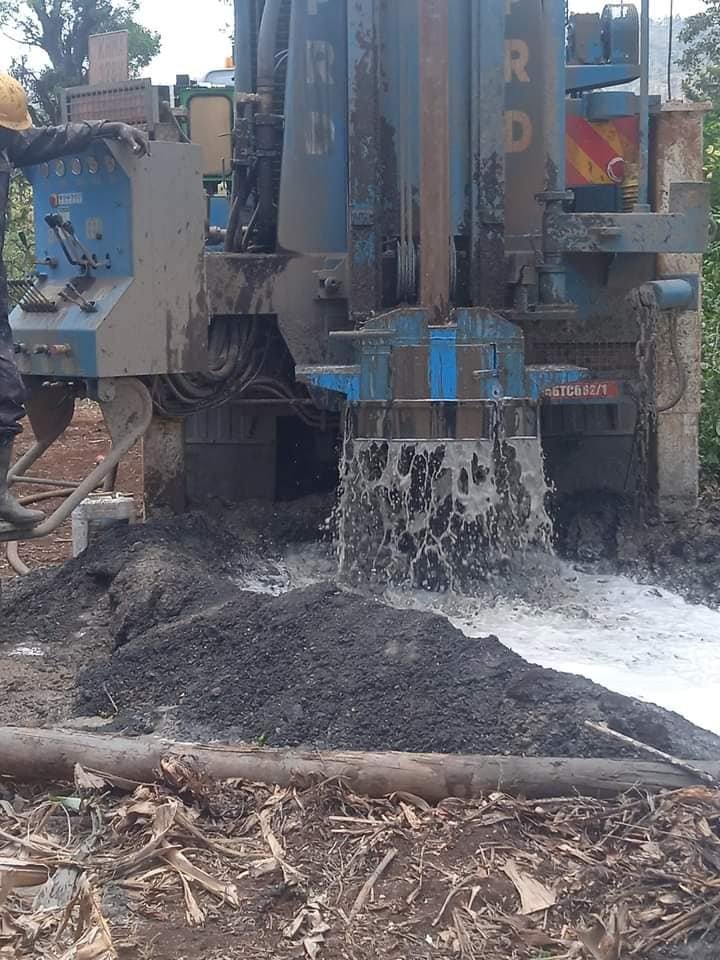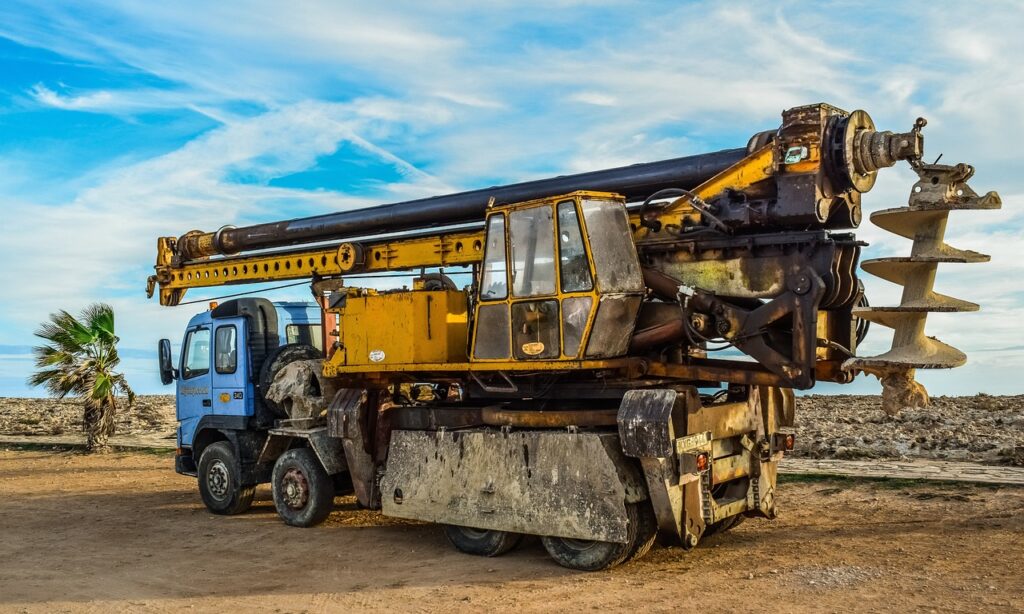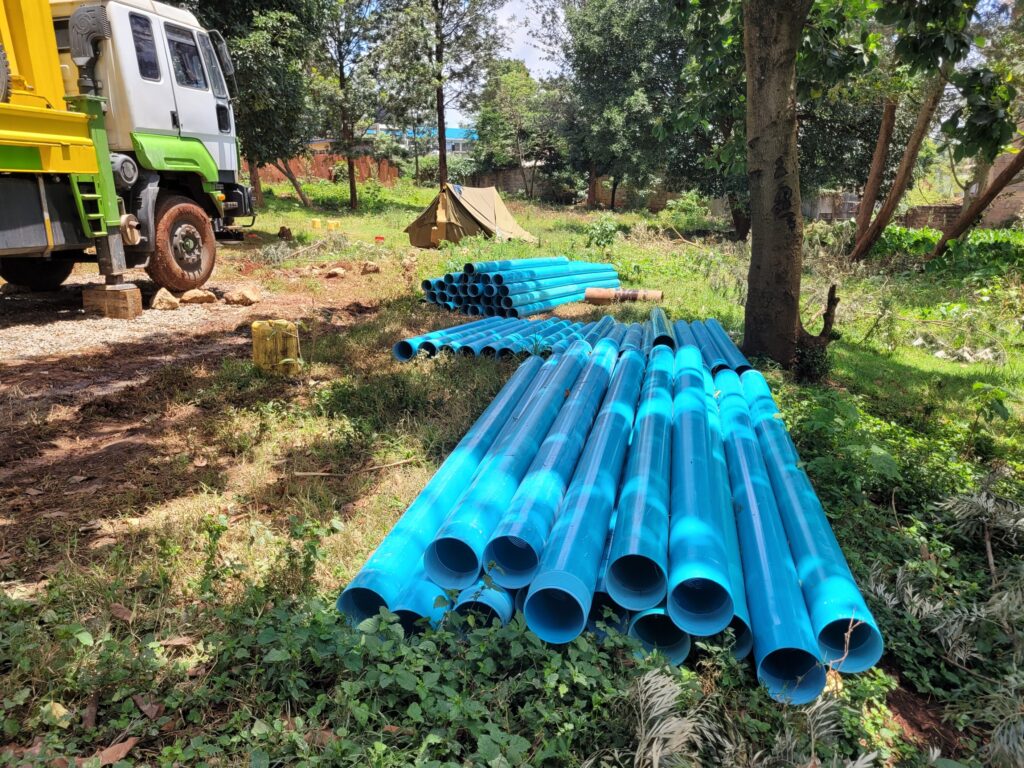You’re planning a borehole project in Kenya. The casing material decision keeps you awake at night.
Should you choose PVC or steel?
This choice affects your water access for the next 50 years.
At Bonvic Drilling, we complete hundreds of successful borehole projects across Kenya.
From coastal Mombasa to highland Nairobi, we’ve seen how the right casing choice ensures decades of reliable water. The wrong choice forces families to re-drill their entire borehole.
This guide reveals our professional decision-making process.
You’ll learn to choose the optimal casing material for your specific conditions.
You’ll avoid costly mistakes that waste your entire investment.
Understanding Borehole Casing Fundamentals

Borehole casing serves as the structural backbone of your entire water system. Your casing performs three functions that determine your project’s success.
Contamination Prevention: Your casing creates a barrier preventing surface pollutants from entering your groundwater supply. In Kenya’s environmental conditions, this protection maintains water quality meeting national standards.
Structural Integrity: Kenya’s geological formations naturally collapse into borehole openings. From coastal sands to highland volcanic soils, quality casing maintains your borehole’s structural integrity throughout its operational life.
Pump Housing: Your casing provides a stable environment for pump installation and operation. This ensures optimal water delivery performance for decades.
The Kenyan market offers multiple casing classifications. Each material offers distinct advantages based on your specific drilling requirements and site conditions.
Field experience shows 78% of successful residential boreholes in Kenya use PVC casing systems according to Kenya Water Institute data. This statistic reflects careful material selection, not universal PVC superiority.
PVC Casing Classifications and Applications

PVC casing technology has evolved significantly. The material now handles demanding applications across Kenya’s varied geological landscape.
Understanding PVC classifications enables optimal material selection for your project depth and conditions.
PVC Class C: The Residential Standard
Technical Specifications:
- Maximum safe depth: 120 meters
- Optimal conditions: Stable geological formations
- Application: Standard residential projects
- Cost position: Most economical option
PVC Class C excels in typical residential scenarios throughout Kenya’s stable geological regions. Our projects in Kiambu, Thika, and parts of Nakuru consistently deliver excellent long-term performance with Class C casing.
Customer Review:
“Our Kiambu borehole uses Class C casing at 100 meters depth. Three years later, perfect water flow every day. Bonvic saved us money without compromising quality.” John Mwangi, Kiambu Homeowner
PVC Class D: Enhanced Performance
Technical Specifications:
- Maximum safe depth: 150-200 meters
- Enhanced pressure rating for deeper applications
- Applications: Deeper residential wells, light commercial projects
- Performance: 25% stronger than Class C
Class D provides the balance between PVC’s cost advantages and enhanced structural capability. This classification handles increased pressures at moderate depths while maintaining PVC’s corrosion resistance.
Our school project in Machakos demonstrates Class D’s capabilities. At 180 meters depth serving 400 students daily, the system operates flawlessly after two years.
Premium Heavy Wall PVC: Maximum PVC Performance
Technical Specifications:
- Depth capability: 200-300+ meters
- Requires expert installation techniques
- Applications: Deep residential, commercial projects in controlled conditions
- Strength: 40% stronger than standard PVC
Premium heavy wall PVC demands precise installation procedures. These include engineered gravel pack design, specialized joint sealing, and careful pressure management. When properly installed by certified technicians, performance rivals steel systems at lower cost.
PVC Material Advantages
Corrosion Resistance: Kenya’s groundwater conditions are chemically aggressive, particularly in areas with high mineral content. PVC maintains structural integrity for 50+ years regardless of water chemistry. Steel experiences corrosion issues in the same conditions.
Economic Benefits: PVC casing costs 60% less than steel equivalents according to Kenya Association of Manufacturers pricing data. For a typical 150-meter residential borehole, this translates to substantial savings without compromising performance in suitable conditions.
Installation Efficiency: PVC’s lighter weight reduces handling requirements. This accelerates installation timelines and minimizes labor costs. These factors significantly impact total project cost and completion schedules.
Chemical Stability: PVC won’t react with groundwater minerals. The material maintains consistent performance regardless of water chemistry variations.
Learn more about PVC pipe standards from Kenya Bureau of Standards
Steel Casing: When Strength Becomes Essential

Steel casing addresses specific drilling conditions where PVC classifications reach their operational limits. Understanding when steel becomes necessary prevents both under-specification failures and unnecessary over-spending.
Deep Borehole Applications
For boreholes exceeding 300 meters depth, hydrostatic pressures and geological stresses require steel’s superior mechanical properties. At these depths, cumulative pressure effects exceed PVC’s structural capabilities regardless of classification.
Our 400-meter borehole project in Turkana demonstrates steel’s necessity for extreme depth applications. The combination of depth, geological instability, and harsh environmental conditions made steel casing the only viable option for long-term reliability.
Challenging Geological Conditions
Unstable Formations: Geological surveys revealing high collapse potential, shifting soils, or pressurized formations require steel’s strength characteristics. These conditions overwhelm PVC systems, leading to casing failure and complete project loss.
Coastal Environments: Kenya’s coastal regions present coral limestone formations and high-salinity groundwater conditions. Our Kilifi projects consistently require steel surface casing minimum. Full steel systems are often necessary for optimal performance.
Surface Casing Applications
Even in PVC-optimized projects, steel surface casing provides essential benefits:
- Protection for shallow aquifer systems
- Structural foundation for deeper casing strings
- Regulatory compliance in environmentally sensitive areas
- Enhanced security against vandalism or surface damage
Steel surface casing typically covers the top 20-30 meters of your borehole.
Steel Performance Data
Kenya Bureau of Standards research demonstrates steel casing performs 40% better in high-stress geological conditions compared to standard PVC alternatives. This performance advantage justifies steel selection when geological assessment indicates challenging conditions.
Expert Quote:
“Steel casing becomes mandatory when geological surveys reveal unstable formations or extreme depths. The 40% performance improvement in high-stress conditions saves clients from catastrophic failures.” Dr. Sarah Kamau, Hydrogeologist, University of Nairobi
Regional Considerations Across Kenya
Kenya’s geological diversity demands region-specific casing strategies. Our experience across the country reveals distinct patterns influencing material selection decisions.
Coastal Region (Mombasa, Kilifi, Kwale)
Geological Characteristics:
- Coral limestone formations
- High groundwater salinity
- Sand infiltration challenges
- Variable water table depths
Coastal projects typically require steel surface casing minimum. Full steel systems are often necessary. The combination of structural demands from coral limestone and corrosive conditions from salinity creates challenging environments for standard PVC systems.
Central Highlands (Nairobi, Kiambu, Nyeri)
Geological Characteristics:
- Volcanic soil formations
- Generally stable geological conditions
- Predictable water table patterns
- Lower salinity groundwater
Highland regions offer ideal conditions for PVC casing systems. Our success rate with PVC classifications exceeds 95% in these areas. Class C and Class D handle the majority of residential and light commercial applications effectively.
Arid and Semi-Arid Lands (Turkana, Marsabit, Garissa)
Geological Characteristics:
- Deep aquifer requirements (200-400+ meters typical)
- Variable geological stability
- Extreme environmental conditions
- High-value water resources
ASAL regions often demand steel casing due to depth requirements and harsh conditions. While initial investment is higher, reliable water access justifies the premium in these challenging environments.
Urban vs Rural Considerations
Urban Requirements:
- Steel surface casing often mandatory for contamination protection
- Stricter regulatory compliance standards
- Higher performance expectations
- Limited space for remedial work
Rural Optimization:
- Greater flexibility in material selection
- Cost optimization opportunities
- Standard residential specifications typically sufficient
- Easier site access for installation and maintenance
Check Kenya Water Resources Authority guidelines for regional requirements
Professional Decision Framework

At Bonvic Drilling, we use a systematic evaluation process for every casing selection decision. This framework prevents costly errors while optimizing performance and cost-effectiveness.
Step 1: Depth Analysis
Depth Ranges and Material Suitability:
- 0-120 meters: PVC Class C primary consideration
- 120-200 meters: PVC Class D evaluation
- 200-300 meters: Premium PVC or steel assessment required
- 300+ meters: Steel mandatory for structural integrity
Step 2: Geological Assessment
Professional geological surveys provide essential data for material selection:
- Formation stability and collapse potential
- Groundwater chemistry and corrosivity
- Pressure zone identification
- Historical performance data for the area
Geological assessment prevents potential losses from inappropriate material selection. This investment provides essential data for confident decision-making.
Step 3: Application Requirements
Residential Applications: Standard residential projects typically optimize with PVC systems when geological conditions permit. The cost savings and proven performance make PVC the preferred choice for most family applications.
Commercial and Institutional: Higher capacity requirements and regulatory standards often influence material selection toward enhanced specifications or steel systems for maximum reliability.
Step 4: Economic Analysis
Our analysis includes:
- Initial material and installation costs
- Expected maintenance requirements over 20-year period
- Replacement risk probability and associated costs
- Regulatory compliance and permitting expenses
Proper material selection typically provides ROI exceeding 300% over a 20-year period. This comes through reliable water access, minimal maintenance requirements, and avoided replacement costs.
Contact us for your hydrogeological consultation
Installation Quality Standards
The finest casing material fails without proper installation. Bonvic Drilling adheres to Kenya Water Resources Authority standards while implementing additional quality measures.
Critical Installation Procedures
Vertical Alignment: Precise alignment throughout installation prevents stress concentration and premature failure. Our certified technicians use laser guidance systems ensuring optimal alignment at every joint.
Joint Sealing: Manufacturer-specified sealing compounds for each casing classification ensure long-term integrity. Improper sealing leads to contamination and structural compromise.
Gravel Pack Design: Engineered gravel pack provides formation support while enhancing well performance. Proper gravel sizing and placement requires technical expertise and quality materials.
Surface Sealing: Regulatory-compliant surface seals protect groundwater resources while securing your investment. Professional sealing prevents contamination and ensures legal compliance.
Quality Assurance Program
Bonvic Drilling Standards:
- Pre-installation material inspection and testing
- Real-time installation monitoring and documentation
- Post-installation pressure testing where applicable
- Complete installation documentation for warranty coverage
- WRMA compliance certification for every project
Customer Review:
“Bonvic’s installation team was professional and thorough. They explained every step and provided complete documentation. Our borehole has been perfect for two years.” Grace Wanjiku, Nakuru Business Owner
Common Mistakes That Cost Thousands

Learning from others’ expensive errors helps you avoid similar pitfalls.
Material Selection Errors
Under-Specification: Using PVC beyond its rated depth or pressure capability leads to catastrophic failure. We’ve witnessed Class C casing failures at 180 meters that required complete re-drilling.
Over-Specification: Choosing steel when PVC would perform adequately wastes money without performance benefits. Proper geological assessment prevents this expensive error.
Contractor Selection Mistakes
Red Flag Indicators:
- Recommends casing without geological survey
- Cannot explain material choice rationale
- Offers identical solutions regardless of site conditions
- Lacks WRMA certification or proper licensing
- Quotes significantly below market rates
Due Diligence Requirements:
- Verify contractor WRMA registration
- Request and check recent project references
- Confirm insurance coverage and bonding
- Evaluate technical knowledge through detailed discussions
- Review proposed installation procedures
Installation Quality Issues
Critical Failure Points:
- Inadequate joint sealing leading to contamination
- Poor alignment causing premature wear and failure
- Insufficient gravel pack resulting in formation collapse
- Improper surface sealing violating regulatory requirements
Your Action Plan
Follow this systematic approach for successful casing selection and implementation.
Phase 1: Pre-Project Planning
Essential First Steps:
- Geological Survey: Invest in professional assessment
- Depth Determination: Identify target aquifer depth through local data and survey results
- Regulatory Research: Understand local WRMA requirements and permitting needs
- Budget Planning: Include all costs in financial planning, not drilling alone
Phase 2: Professional Consultation
Technical Evaluation:
- Discuss geological survey results with qualified drillers
- Review material recommendations with detailed justification
- Understand installation procedures and quality measures
- Confirm regulatory compliance procedures
Phase 3: Contractor Selection
Evaluation Criteria:
- WRMA certification and proper licensing
- Recent relevant project experience
- Technical knowledge demonstration
- Quality assurance procedures
- Comprehensive warranty coverage
Phase 4: Project Implementation
Oversight Responsibilities:
- Monitor installation procedures for compliance
- Verify material specifications match agreements
- Ensure proper documentation for warranty
- Confirm regulatory compliance certification
Start your project with our free consultation
Why Choose Bonvic Drilling for Your Casing Project
Our commitment to technical excellence and customer success sets us apart in Kenya’s borehole industry.
Technical Expertise
Professional Qualifications:
- WRMA certified and licensed
- 5+ years specialized experience across Kenya
- Hundreds of successful residential and commercial projects
- Continuous technical training and certification maintenance
Comprehensive Services
Complete Project Solutions:
- Free geological consultation for qualified projects
- Professional site assessment and material recommendation
- Expert installation with quality assurance
- Complete WRMA compliance and documentation
- Comprehensive warranty coverage
Regional Experience
Our successful projects span from coastal Mombasa to highland Nairobi. This demonstrates expertise across Kenya’s diverse geological conditions. This experience ensures optimal material selection for your specific location and requirements.
Quality Commitment
Every Bonvic Drilling project meets or exceeds WRMA installation standards. We implement additional quality measures developed through years of field experience.
Customer Reviews:
“Bonvic completed our 180-meter borehole in Machakos perfectly. Professional team, quality materials, and excellent after-sales support. Highly recommend them.” Rating: 5/5 Stars – Peter Kiprotich, Machakos
“Best drilling company in Kenya. They explained everything clearly and delivered exactly what they promised. Our water flow is excellent.” Rating: 5/5 Stars – Mary Njeri, Kiambu
“Professional service from start to finish. Bonvic’s expertise saved us from making expensive mistakes. Worth every penny.” Rating: 5/5 Stars – Samuel Ochieng, Kisumu
Take Action Today
Don’t let uncertainty delay your water security. The right casing decision today ensures your family enjoys reliable water access for generations.
Immediate Next Steps
Start Your Project:
- Free Consultation: Contact us for geological consultation and material recommendation
- Site Assessment: Professional evaluation of your specific conditions
- Detailed Quote: Comprehensive project proposal with material specifications
- Project Timeline: Clear scheduling and completion expectations
Contact Information
Get Started Today:
- Website: bonvicdrilling.com
- Phone/WhatsApp: +254-720-545-191
- Email: hello@bonvicdrilling.com
Service Areas
We proudly serve all regions of Kenya. We bring professional borehole solutions to communities nationwide.
Bonvic Drilling is a licensed and certified borehole contractor registered with the Kenya Water Resources Authority. Our commitment to technical excellence and customer satisfaction has established us as Kenya’s trusted partner for reliable water access solutions.
Related Articles:
- How Far Apart Should Boreholes Be in Kenya?
- Borehole Drilling Hidden Costs Nobody Tells You About
- Solar Borehole Pump Installation Kenya
- Borehole Water Quality Testing in Kenya: 7 Essential Tests
- Stop Gambling with Rain: Best Irrigation Systems Kenya
Learn more about Kenya’s groundwater resources from Kenya Water Institute
Check current water regulations at Ministry of Water and Sanitation



certainly like your website but you need to take a look at the spelling on quite a few of your posts Many of them are rife with spelling problems and I find it very troublesome to inform the reality nevertheless I will definitely come back again
Normally I do not read article on blogs however I would like to say that this writeup very forced me to try and do so Your writing style has been amazed me Thanks quite great post
Attractive section of content I just stumbled upon your blog and in accession capital to assert that I get actually enjoyed account your blog posts Anyway I will be subscribing to your augment and even I achievement you access consistently fast
Your blog is a true hidden gem on the internet. Your thoughtful analysis and engaging writing style set you apart from the crowd. Keep up the excellent work!
Simply desire to say your article is as surprising The clearness in your post is simply excellent and i could assume you are an expert on this subject Fine with your permission let me to grab your feed to keep up to date with forthcoming post Thanks a million and please carry on the gratifying work
Your blog is a breath of fresh air in the often mundane world of online content. Your unique perspective and engaging writing style never fail to leave a lasting impression. Thank you for sharing your insights with us.
Nice blog here Also your site loads up very fast What host are you using Can I get your affiliate link to your host I wish my site loaded up as quickly as yours lol
Your blog is a beacon of light in the often murky waters of online content. Your thoughtful analysis and insightful commentary never fail to leave a lasting impression. Keep up the amazing work!
I just wanted to drop by and say how much I appreciate your blog. Your writing style is both engaging and informative, making it a pleasure to read. Looking forward to your future posts!
I am not sure where youre getting your info but good topic I needs to spend some time learning much more or understanding more Thanks for magnificent info I was looking for this information for my mission
I just could not leave your web site before suggesting that I really enjoyed the standard information a person supply to your visitors Is gonna be again steadily in order to check up on new posts